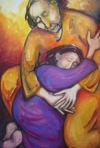|
Some Christians tend to think of repentance in terms of occasionally confessing their sins in private prayer, but the Hebrew word teshuvah (ΧͺΦΌΦ°Χ©ΧΧΦΌΧΦΈΧ) implies turning to others and to God -- thereby radically changing the "direction" and focus of our lives. According to Jewish tradition this is accomplished through the practice of the following steps.
Steps of Teshuvah:
- We must recognize our sin as a sin (i.e., hakarat chata'ah [ΧΦ·ΧΦΌΦΈΧ¨Φ·Χͺ ΧΦ·ΧΦΌΦΈΧΦΈΧ]). This comes from honest efforts at self-examination (i.e., cheshbon ha-nefesh [ΧΦΆΧ©ΧΦ°ΧΦΌΧΦΉΧ ΧΦ·Χ ΦΌΦΆΧ€ΦΆΧ©Χ]) in light of God's revealed truth and by the voice of our own conscience (Acts 24:16, Rom. 2:5). Acknowledging the truth about our sin leads to confession (i.e., viduy [ΧΦ΄ΧΦΌΧΦΌΧ]) - first inwardly to ourselves and then directly to God.
- If we committed a sin against another person, we must confess our sin to that person and ask them for forgiveness. In Jewish thought, only the offending party can set the wrong aright and only the offended party can forgo the debt of the sin (this is called mechilah [ΧΦ°ΧΦ΄ΧΧΦΈΧ]). This means, among other things, that our sin against another must be dealt with "independently" from our sins against God (see Matt. 5:23-24). The sages make this point when they say that "even Yom Kippur cannot atone for offenses against other people." If I offend someone, it is my responsibility to set the matters right (conversely, if someone has offended me, it is my responsibility to allow the offender to do teshuvah and correct the wrong done to me. The refusal to pardon another who sincerely asks is considered cruel). Jewish tradition states that the offended person is not obligated to extend mechilah to the offender if he is insincere or if he has not taken concrete steps to demonstrate remorse for the offense.
- We must cease from the sin (azivat ha-chet). It is generally regarded that those who refuse to stop sinning are not being sincere in their expression of teshuvah. Of course, we might struggle with addictions and compulsive behaviors, and it is our responsibility to get help with these issues for healing to take place. If another person, however, sincerely asks us for mechilah -- even if they've harmed us "seventy times seven times" -- we are nonetheless obligated to forgive them (see Matt. 18:21-22). In other words, we are responsible to stop our own sinning -- yet we are responsible to extend forgiveness to those who repeatedly sin against us.
- We must show remorse and regret for the sin (i.e., charatah [ΧΦ²Χ¨ΦΈΧΦΈΧ]). This is an emotional response in light of the harm our actions have caused others and ourselves. This is an entirely subjective matter between your heart and God, though genuinely expressing remorse may help in the reconciliation process with others.
- We must resolve to live in a new way (kabbalah al ha-atid) by choosing to refrain from the sinful action in the future. Again, this involves the intent of the heart and inner resolution -- and therefore is a matter between you and God alone. Promising to others that you will change is a dubious practice.
All of these steps are necessary and interrelated. We cannot rightly "confess" our sins to God and expect to be forgiven when we are conscious that we have grieved someone due to our sinful or thoughtless actions. No, we must seek forgiveness from the offended friend.... After all, we are part of a larger "body" (i.e., community) and when one member hurts, the entire community is affected (1 Cor. 12:26). We must be ready to acknowledge the wounds we have caused others and to seek their forgiveness; we must likewise be ready to forgive those who have offended us. Only in this way can our relationships be restored and love prevail in our midst.... "Love is the perfect bond of unity" (Col. 3:14).
When we sin against another person, we hurt them. The natural response to being hurt is to withdraw or pull away from the source of pain. This causes an emotional breach in a relationship. Left uncorrected, the original desire for friendship is replaced with a sense of ambivalence or even aversion. Confessing our sin means admitting to the other person that we know that we've hurt them. This humbles us and shows that we are experiencing pain because of the broken relationship. By humbling ourselves in this way we may revive the latent feelings of love in the offended friend and reconciliation can take place....
When we turn to God and begin to wake up to reality, we grieve over the fact that we've harmed ourselves and others. As we walk in love, God will prompt us to restore the broken relationships in our lives. The way of teshuvah is the path of love and reconciliation. This is essentially the goal of Torah, too: "The goal of our instruction is love from a pure heart and a good conscience and a sincere faith" (1 Tim. 1:5). "For the whole Torah is fulfilled in one word: "You shall love your neighbor as yourself" (Gal. 5:14) and "love is the fulfilling of the Torah" (Rom. 13:8). As the Apostle Paul wrote:
Be renewed in the spirit of your minds and put on the new self, created after the likeness of God in true righteousness and holiness. Therefore, having put away falsehood, let each one of you speak the truth with his neighbor, for we are members one of another.... And do not grieve the Holy Spirit of God, by whom you were sealed for the day of redemption. Let all bitterness and wrath and anger and clamor and slander be put away from you, along with all malice. Be kind to one another, tenderhearted, forgiving one another, just as God in the Messiah has forgiven you. Therefore be imitators of God, as beloved children, and walk in love, as the Messiah loved us and gave himself up for us, a fragrant offering and sacrifice to God. (Eph. 4:23-5:2)

It's traditional to ask God to give us a sweet year after we dip our apples in honey on Rosh Hashanah. Yehi ratzon milfanekha, Adonai Elohenu, velohei avotenu, she-te-chadesh alenu shanah tovah um'tukah: "May it be your will, LORD our God and God of our fathers, that you renew for us a good and sweet year." If we genuinely undergo teshuvah, we can indeed trust that our coming new year will be one of sweetness and good fellowship. It's my hope and prayer that each of us will walk in love of our beloved Messiah, blessed be He. Amen.
|



